- Home
- Jonathan Stroud
The Dagger in the Desk Page 3
The Dagger in the Desk Read online
Page 3
‘That’s it,’ Lockwood breathed. ‘We’re almost there . . .’
Air stirred. I looked to the side. A figure stood beside us in the dark. It had long white hair, and naked, grinning teeth.
I screamed, gave a final desperate shove. The wall moved: the panel swung open. Lockwood, George and I fell forward through the hole.
Whatever we landed on was both soft and brittle. Dry things snapped beneath us; I heard the sliding chink of coins. Momentum carried me furthest: I did a brisk head-over-heels and ended up in a sitting position, with my boots wedged against the opposite wall. I jumped to my feet, whipped out my torch and switched it on.
We were in a tiny windowless room, made smaller by the piled chests and boxes ranged along one wall. Some were closed; others, lidless, were full to overflowing with a strange medley of objects: candelabras, vases, even paintings. Everything was swathed in layers of dusty cobwebs. No surprises here. Spiders love Sources; they can’t get enough of them.
Speaking of the Source, it was right beneath us. We’d landed on it. Lockwood and George were hastily rolling clear. Directly in front of the secret panel, a body lay face down upon the floor. It was pretty cobwebby, but you could see the old-style jacket, the flannel trousers, the rotting leather shoes. Here and there were glimpses of yellowed bone. The head was hidden beneath a heavy wooden chest, the lid of which had broken open, and by a mass of greenish coins that had poured forth from it, half swallowing the skull. A certain amount of white hair still poked through, but the face was mercifully concealed.
None of us said anything. George was pulling his bag from his back, Lockwood tearing it open, looking for the silver. I kept my eyes trained on the secret door, on the dark corners of the room. I could feel the presence close at hand. But nothing stirred now. Maybe I’d sapped the thing’s strength out in the corridor; or maybe it had finally accepted what we were here to do. Who knew with ghosts? It was impossible to say.
Lockwood took a silver net from the bag, unfolded it to its full extent, and laid it over the body. At once I felt a lifting of the spirits, a change to the atmosphere in the secret room. I listened, tense and ready. No . . . it was OK. The presence was truly gone.
We stood there in silence.
‘Look at all the stuff he pinched,’ Lockwood said at last. ‘Quite the little collector, wasn’t he?’
‘That shelf broke,’ I said. ‘Look there – just above the door. He was hiding in here, maybe getting ready to nip off after dark. He had his chest of stolen money sitting on the shelf. Then it fell down and brained him. Cracked his skull or broke his neck. That’s how it happened.’
‘Just deserts, I suppose,’ Lockwood said. ‘He shouldn’t have nicked so much. Well, it’s over now.’
George stepped over the corpse and began rummaging in his bag. ‘Great. So, who fancies a celebratory bun? I’ve got some iced ones here.’
Lockwood hesitated. ‘Er, possibly in a minute. When we’re somewhere else.’ He smiled. ‘Well done, everybody. Especially you, Luce. You did really well tonight. Made the right decisions at every turn.’
I grinned back, flushing a little, as I sometimes do when Lockwood trains his smile on me. ‘Oh, that’s OK,’ I said. ‘It wasn’t just me, really. This job’s all about teamwork, isn’t it? I couldn’t have done it on my own.’ I gazed down at the pile of coins, and at the boxes stacked against the walls. ‘Think this stuff’ll be worth anything now?’
‘Expect so,’ Lockwood said. ‘Mr Whitaker can probably afford more refurbishments to the school.’
George picked up his bag. ‘He might start with the boys’ toilets. I can smell them from here. So, is that it, then? Are we done?’
Lockwood nodded. ‘Yes . . . Yes, I think we are.’
And with that we left the room behind us, and went to have a bun.
A Gallery of Ghosts
Shade
The most common variety of Type One ghost, a Shade is weak, faint and unresponsive to the living. It keeps to itself, endlessly replaying a single moment from long ago. Easy to subdue using salt and iron.
Cold Maiden
The traditional floaty female ghost, usually featuring long hair, longer dresses, and plenty of weeping and hand-wringing. Generally wracked by ancient grief or guilt, Cold Maidens are too self-absorbed to be much of a problem to agents.
Phantasm
A formidable Type Two spirit, ethereal, translucent and hungry for contact with the living. Phantasms are hard to spot – even for those with psychic Sight – and are best observed out of the corner of one’s eyes.
Spectre
The solid-seeming Spectre is the most common of Type Two ghost. At a casual glance, it may be hard to distinguish from a living person; closer analysis will reveal its old-fashioned clothes, unnaturally bright eyes, and undead pallor.
Wraith
Not the variety of ghost you’d want to meet on a dark night. Voracious, malevolent and cloaked in the shape either of a skeleton or a rotting corpse, a Wraith can overpower its victims through power of terror alone.
Dark Spectre
A mercifully rare Type Two apparition, revealed as an undulating cloud of blackness. Hangs in the air, swelling and shrinking, while sending out tendrils to snare the onlooker. Also leaves behind appalling ectoplasm stains on wallpaper and soft furnishings.
Poltergeist
This Type Two spirit produces no visible apparition, but moves material objects using telekinetic power. Weak Poltergeists ruffle curtains and knock books off tables; strong ones can wreak havoc across whole buildings.
Changer
Unlike most ghosts, which always maintain the same appearance, the Changer can alter its shape and behaviour. Animal guises are common, and far weirder shapes are not unknown. This unpredictability makes a Changer very hard to destroy.
Read on for a sneak peek of Lockwood & Co.: The Screaming Staircase
1
Of the first few hauntings I investigated with Lockwood & Co. I intend to say little, in part to protect the identity of the victims, in part because of the gruesome nature of the incidents, but mainly because, in a variety of ingenious ways, we succeeded in cocking them all up. There, I’ve admitted it! Not a single one of those early cases ended as neatly as we’d have wished. Yes, the Mortlake Horror was driven out, but only as far as Richmond Park, where even now it stalks by night amongst the silent trees. Yes, both the Grey Spectre of Aldgate and the entity known as the Clattering Bones were destroyed, but not before several further (and, I now think, unnecessary) deaths. And as for the creeping shadow that haunted young Mrs Andrews, to the imperilment of her sanity and her hemline, wherever she may continue to wander in this world, poor thing, there it follows too. So it was not exactly an unblemished record that we took with us, Lockwood and I, when we walked up the path to 62 Sheen Road on that misty autumn afternoon and briskly rang the bell.
We stood on the doorstep with our backs to the muffled traffic, and Lockwood’s gloved right hand clasped upon the bell-pull. Deep in the house, the echoes faded. I gazed at the door: at the small sun-blisters on the varnish and the scuffs on the letterbox; at the four diamond panes of frosted glass that showed nothing beyond except for darkness. The porch had a forlorn and unused air, its corners choked with the same sodden beech leaves that littered the path and lawn.
‘OK,’ I said. ‘Remember our new rules. Don’t just blab out anything you see. Don’t speculate openly about who killed who, how, or when. And above all don’t impersonate the client. Please. It never goes down well.’
‘That’s an awful lot of don’ts, Lucy,’ Lockwood said.
‘Too right it is.’
‘You know I’ve got an excellent ear for accents. I copy people without thinking.’
‘Fine, copy them quietly after the event. Not loudly, not in front of them, and particularly not when they’re a six-foot-six Irish dockworker with a speech impediment, and we’re a good half-mile from the public road.’
‘Yes, he wa
s really quite nimble for his size,’ Lockwood said. ‘Still, the chase will have kept us fit. Sense anything?’
‘Not yet. But I’m hardly likely to, out here. You?’
He let go of the bell-pull and made some minor adjustment to the collar of his coat. ‘Oddly enough, I have. There was a death in the garden sometime in the last few hours. Under that laurel halfway up the path.’
‘I assume you’re going to tell me it’s only a smallish glow.’ My head was tilted on one side, my eyes half closed; I was listening to the silence of the house.
‘Yes, about mouse-sized,’ Lockwood admitted. ‘Suppose it might have been a vole. I expect a cat got it or something.’
‘So . . . possibly not part of our case, then, if it was a mouse?’
‘Probably not.’
Beyond the frosted panes, in the interior of the house, I spied a movement: something shifting in the hall’s black depths. ‘OK, here we go,’ I said. ‘She’s coming. Remember what I said.’
Lockwood bent his knees and picked up the duffel bag beside his feet. We both moved back a little, preparing pleasant, respectful smiles.
We waited. Nothing happened. The door stayed shut.
There was no one there.
As Lockwood opened his mouth to speak, we heard footsteps behind us on the path.
‘I’m so sorry!’ The woman emerging from the mists had been walking slowly, but as we turned she accelerated into a token little trot. ‘So sorry!’ she repeated. ‘I was delayed. I didn’t think you’d be so prompt.’
She climbed the steps, a short, well-padded individual with a round face expanding into middle age. Her straight, ash-blonde hair was fixed back in a no-nonsense manner by clips above her ears. She wore a long black skirt, a crisp white shirt, and an enormous woollen cardigan with sagging pockets at the sides. She carried a thin folder in one hand.
‘Mrs Hope?’ I said. ‘Good evening, madam. My name is Lucy Carlyle and this is Anthony Lockwood, of Lockwood and Co. We’ve come about your call.’
The woman halted on the topmost step but one, and regarded us with wide grey eyes in which all the usual emotions featured. Distrust, resentment, uncertainty and dread – they were all there. They come as standard in our profession, so we didn’t take it personally.
Her gaze darted back and forth between us, taking in our neat clothes and carefully brushed hair, the polished rapiers glittering at our belts, the heavy bags we carried. It lingered long on our faces. She made no move to go past us to the door of the house. Her free hand was thrust deep into the pocket of her cardigan, forcing the fabric down.
‘Just the two of you?’ she said at last.
‘Just us,’ I said.
‘You’re very young.’
Lockwood ignited his smile; its warmth lit up the evening. ‘That’s the idea, Mrs Hope. You know that’s the way it has to be.’
‘Actually, I’m not Mrs Hope.’ Her own wan smile, summoned in involuntary response to Lockwood’s, flickered across her face and vanished, leaving anxiety behind. ‘I’m her daughter, Suzie Martin. I’m afraid Mother isn’t coming.’
‘But we arranged to meet her,’ I said. ‘She was going to show us round the house.’
‘I know.’ The woman looked down at her smart black shoes. ‘I’m afraid she’s no longer willing to set foot here. The circumstances of Father’s death were horrible enough, but recently the nightly . . . disturbances have been too persistent. Last night was very bad, and Mother decided she’d had enough. She’s staying with me now. We’ll have to sell up, but obviously we can’t do that until the house is made safe . . .’ Her eyes narrowed slightly. ‘Which is why you’re here . . . Excuse me, but shouldn’t you have a supervisor? I thought an adult always had to be present at an investigation. Exactly how old are you?’
‘Old enough and young enough,’ Lockwood said, smiling. ‘The perfect age.’
‘Strictly speaking, madam,’ I added, ‘the law states that an adult is only required if the operatives are undergoing training. It’s true that some of the bigger agencies always use supervisors, but that’s their private policy. We’re fully qualified and independent, and we don’t find it necessary.’
‘In our experience,’ Lockwood said sweetly, ‘adults just get in the way. But of course we do have our licences here, if you’d like to see them.’
The woman ran a hand across the smooth surface of her neat blonde hair. ‘No, no . . . That won’t be necessary. Since Mother clearly wanted you, I’m sure it will be fine . . .’ Her voice was neutral and uncertain. There was a brief silence.
‘Thank you, madam.’ I glanced back towards the quiet, waiting door. ‘There’s just one other thing. Is there someone else at home? When we rang the bell, I thought—’
Her eyes rose rapidly, met mine. ‘No. That’s quite impossible. I have the only key.’
‘I see. I must’ve been mistaken.’
‘Well, I won’t delay you,’ Mrs Martin said. ‘Mother’s completed the form you sent her.’ She held out the buff folder. ‘She hopes it will be useful.’
‘I’m sure it will.’ Lockwood tucked it somewhere inside his coat. ‘Thank you very much. Well, we’d better get started. Tell your mother we’ll be in touch in the morning.’
The woman handed him a ring of keys. Somewhere along the road a car horn blared, to be answered by another. There was plenty of time till curfew, but night was falling and people were growing antsy. They wanted to get home. Soon there’d be nothing moving in the London streets but trails of mist and twisting moonbeams. Or nothing, at least, any adult there could clearly see.
Suzie Martin was conscious of this too. She raised her shoulders, pulled her cardigan tight. ‘Well, I’d better be going. I suppose I should wish you luck . . .’ She looked away. ‘So very young! How terrible that the world should have come to this.’
‘Goodnight, Mrs Martin,’ Lockwood said.
Without reply, she pattered down the steps. In a few seconds she had vanished among the mists and laurels in the direction of the road.
‘She’s not happy,’ I said. ‘I think we’ll be off the case tomorrow morning.’
‘Better get it solved tonight, then,’ Lockwood said. ‘Ready?’
I patted the hilt of my rapier. ‘Ready.’
He grinned at me, stepped up to the door and, with a magician’s flourish, turned the key in the lock.
When entering a house occupied by a Visitor, it’s always best to get in quick. That’s one of the first rules you learn. Never hesitate, never linger on the threshold. Why? Because, for those few seconds, it’s not too late. You stand there in the doorway with the fresh air on your back and the darkness up ahead, and you’d be an idiot if you didn’t want to turn and run. And as soon as you acknowledge that, your willpower starts draining away through your boots, and the terror starts building in your chest, and bang, that’s it – you’re compromised before you begin. Lockwood and I both knew this, so we didn’t hang around. We slipped straight through, put down our bags, and shut the door softly behind us. Then we stood quite still with our backs against it, watching and listening side by side.
The hall of the house lately occupied by Mr and Mrs Hope was long and relatively narrow, though the high ceiling made it seem quite large. It was floored with black and white marble tiles, set diagonally, and flanked by palely papered walls. Halfway along, a steep staircase rose into shadows. The hall kinked round this to the left and continued into a void of black. Doorways opened on either side: gaping, choked in darkness.
All of which could have been nicely illuminated if we’d put on the lights, of course. And there was a switch on the wall right there. But we didn’t attempt to use it. You see, a second rule you learn is this: electricity interferes. It dulls the senses and makes you weak and stupid. It’s much better to watch and listen in the dark. It’s good to have that fear.
We stood in silence, doing what we do. I listened. Lockwood watched. It was cold in the house. The air had that musty, slightly s
our smell you get in every unloved place.
I leaned in close to Lockwood. ‘No heating,’ I whispered.
‘Mm-hm.’
‘Something else too, you think?’
‘Mm-hm.’
As my eyes grew used to the dark, I saw more details. Beneath the curl of the banister was a little polished table, on which sat a china bowl of potpourri. There were pictures on the wall, mostly faded posters of old-time musicals, and photographs of rolling hills and gentle seas. All pretty innocuous. In fact it wasn’t at all an ugly hallway; in bright sunlight it might have looked quite pleasant. But not so much now, with the last light from the door panes stretching out like skewed coffins on the floor in front of us; with our shadows neatly framed inside them; and with the manner of old Mr Hope’s death in this very place hanging heavy in our minds.
I breathed hard to calm myself and shut out morbid thoughts. Then I closed my eyes against the taunting darkness and listened.
Listened . . .
Halls, landings and staircases are the arteries and airways of any building. It’s here that everything is channelled. You get echoes of things currently going on in all the connecting rooms. Sometimes you also get other noises that, strictly speaking, ought not to be there at all. Echoes of the past, echoes of hidden things . . .
This was one such time.
I opened my eyes, picked up my bag and walked slowly down the hall towards the stairs. Lockwood was already standing by the little polished table beneath the banister. His face shone dimly in the light from the door. ‘Heard something?’ he said.

 The Leap
The Leap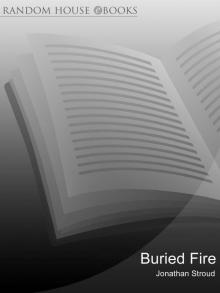 Buried Fire
Buried Fire Heroes of the Valley
Heroes of the Valley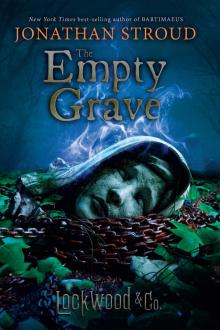 The Empty Grave
The Empty Grave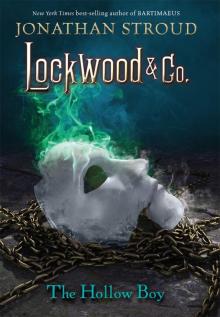 The Hollow Boy
The Hollow Boy The Last Siege
The Last Siege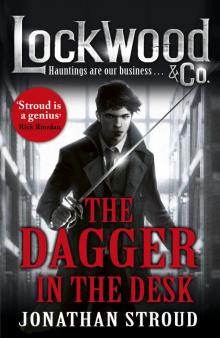 The Dagger in the Desk
The Dagger in the Desk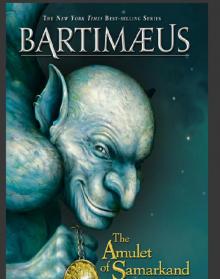 The Amulet of Samarkand
The Amulet of Samarkand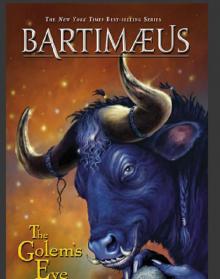 The Golem's Eye
The Golem's Eye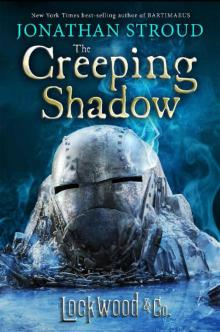 The Screaming Staircase
The Screaming Staircase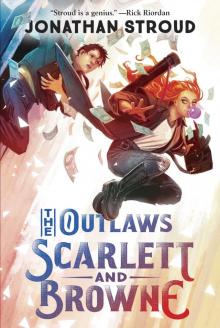 The Outlaws Scarlett and Browne
The Outlaws Scarlett and Browne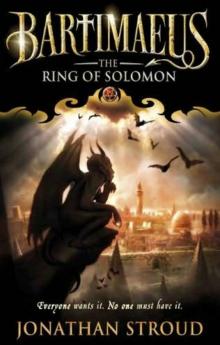 The Ring of Solomon: A Bartimaeus Novel
The Ring of Solomon: A Bartimaeus Novel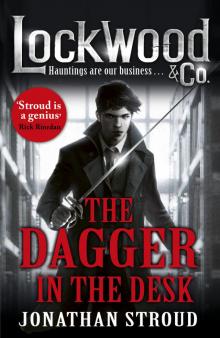 Lockwood & Co
Lockwood & Co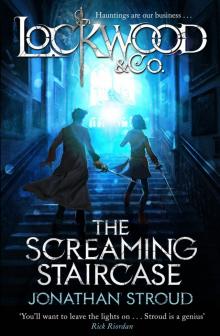 Lockwood & Co: The Screaming Staircase
Lockwood & Co: The Screaming Staircase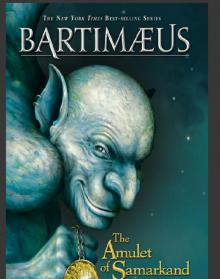 Bartimaeus: The Amulet of Samarkand
Bartimaeus: The Amulet of Samarkand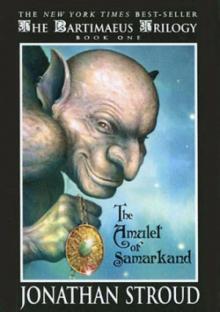 The Amulet of Samarkand tbt-1
The Amulet of Samarkand tbt-1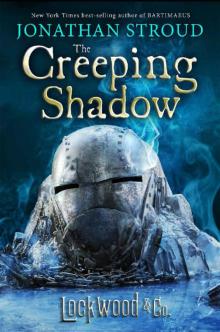 Lockwood & Co.: The Creeping Shadow
Lockwood & Co.: The Creeping Shadow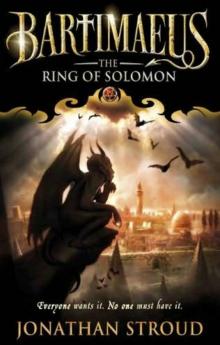 The Ring of Solomon
The Ring of Solomon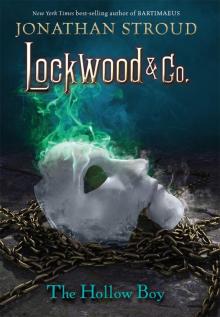 Lockwood & Co. Book Three: The Hollow Boy
Lockwood & Co. Book Three: The Hollow Boy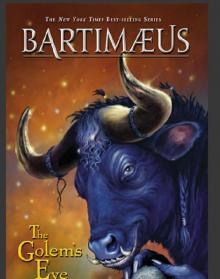 Bartimaeus: The Golem’s Eye
Bartimaeus: The Golem’s Eye